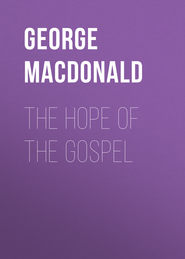По всем вопросам обращайтесь на: info@litportal.ru
(©) 2003-2025.
✖
A Hidden Life and Other Poems
Настройки чтения
Размер шрифта
Высота строк
Поля
Thou feelest tender hands that break
The iron bonds at length.
Thou knowest life rush swift along
Thy form bent sadly low;
And up, amidst the wondering throng
Thou risest firm and slow,
And seëst him. Erect once more
In human right divine,
Joyous thou bendest yet before
The form that lifted thine.
O Saviour, Thou, long ages gone,
Didst lift her joyous head:
Now, many hearts are moaning on,
And bending towards the dead.
They see not, know not Thou art nigh:
One day thy word will come;
Will lift the forward-beaming eye,
And strike the sorrow dumb.
Thy hand wipes off the stains of time
Upon the withered face;
Thy old men rise in manhood's prime
Of dignity and grace.
Thy women dawn like summer days
Old winters from among;
Their eyes are filled with youthful rays,
The voice revives in song.
All ills of life will melt away
Like cureless dreams of woe,
When with the dawning of the day
Themselves the sad dreams go.
O Lord, Thou art my saviour too:
I know not what my cure;
But all my best, Thou, Lord, wilt do;
And hoping I endure.
VII.
THE WOMAN WHO CAME BEHIND HIM IN THE CROWD
Near him she stole, rank after rank;
She feared approach too loud;
She touched his garment's hem, and shrank
Back in the sheltering crowd.
A trembling joy goes through her frame:
Her twelve years' fainting prayer
Is heard at last; she is the same
As other women there.
She hears his voice; He looks about.
Ah! is it kind or good
To bring her secret sorrow out
Before that multitude?
With open love, not secret cure,
The Lord of hearts would bless;
With age-long gladness, deep and sure,
With wealth of tenderness.
Her shame can find no shelter meet;
Their eyes her soul appal:
Forward she sped, and at his feet
Fell down, and told Him all.
His presence made a holy place;
No alien eyes were there;
Her shamed-faced grief found godlike grace;
More sorrow, tenderer care.
"Daughter, thy faith hath made thee whole;
Go, and be well, and glad."
Ah, Lord! if we had faith, our soul
Not often would be sad.
Thou knowest all our hidden grief
Which none but Thee can know;
Thy knowledge, Lord, is our relief;
Thy love destroys our woe.
VIII.
THE WIDOW WITH THE TWO MITES
Here much and little change their name
With changing need and time;
But more and less new judgments claim,
Where all things are sublime.
Sickness may be more hale than health,
And service kingdom high;
Yea, poverty be bounty's wealth,
To give like God thereby.
The iron bonds at length.
Thou knowest life rush swift along
Thy form bent sadly low;
And up, amidst the wondering throng
Thou risest firm and slow,
And seëst him. Erect once more
In human right divine,
Joyous thou bendest yet before
The form that lifted thine.
O Saviour, Thou, long ages gone,
Didst lift her joyous head:
Now, many hearts are moaning on,
And bending towards the dead.
They see not, know not Thou art nigh:
One day thy word will come;
Will lift the forward-beaming eye,
And strike the sorrow dumb.
Thy hand wipes off the stains of time
Upon the withered face;
Thy old men rise in manhood's prime
Of dignity and grace.
Thy women dawn like summer days
Old winters from among;
Their eyes are filled with youthful rays,
The voice revives in song.
All ills of life will melt away
Like cureless dreams of woe,
When with the dawning of the day
Themselves the sad dreams go.
O Lord, Thou art my saviour too:
I know not what my cure;
But all my best, Thou, Lord, wilt do;
And hoping I endure.
VII.
THE WOMAN WHO CAME BEHIND HIM IN THE CROWD
Near him she stole, rank after rank;
She feared approach too loud;
She touched his garment's hem, and shrank
Back in the sheltering crowd.
A trembling joy goes through her frame:
Her twelve years' fainting prayer
Is heard at last; she is the same
As other women there.
She hears his voice; He looks about.
Ah! is it kind or good
To bring her secret sorrow out
Before that multitude?
With open love, not secret cure,
The Lord of hearts would bless;
With age-long gladness, deep and sure,
With wealth of tenderness.
Her shame can find no shelter meet;
Their eyes her soul appal:
Forward she sped, and at his feet
Fell down, and told Him all.
His presence made a holy place;
No alien eyes were there;
Her shamed-faced grief found godlike grace;
More sorrow, tenderer care.
"Daughter, thy faith hath made thee whole;
Go, and be well, and glad."
Ah, Lord! if we had faith, our soul
Not often would be sad.
Thou knowest all our hidden grief
Which none but Thee can know;
Thy knowledge, Lord, is our relief;
Thy love destroys our woe.
VIII.
THE WIDOW WITH THE TWO MITES
Here much and little change their name
With changing need and time;
But more and less new judgments claim,
Where all things are sublime.
Sickness may be more hale than health,
And service kingdom high;
Yea, poverty be bounty's wealth,
To give like God thereby.











